
Monday night’s Village of Bristol Board meeting was marked by a series of pointed criticisms and urgent calls for improvement, particularly concerning the handling of the November 2024 election and the management of local government practices. Only three trustees—Trustees Leker, McCabe, and Kordecki—were present to hear the concerns expressed by a number of citizens during the public comments portion of the meeting. Only Trustee Leker made a point to address the concerns, stating “I do take the election seriously” and “I thank everybody for working late and diligently and trying to do a good job for our elections”. Leker, who joined the team at First Christian Church that were counting ballots well into the next morning, also expressed regrets that he hadn’t been trained so he could help out himself.
Election Day Chaos: A Series of Missteps
Several speakers highlighted significant issues they experienced during the election, with complaints ranging from improper voter identification verification to serious procedural errors in polling operations.
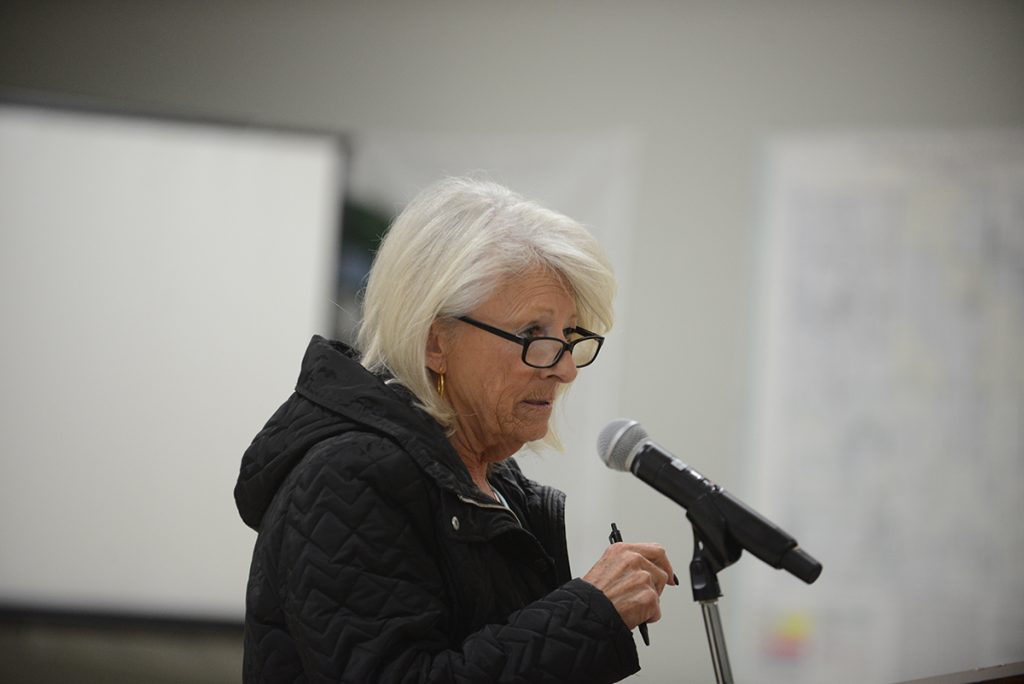
(Photo by Kevin Mathewson, Kenosha County Eye)
Mary Ring, a poll worker, described confusion surrounding voter identification. She recounted an incident where a voter presented a Colorado driver’s license, which caused initial uncertainty about their eligibility. After consulting with the Clerk who consulted the Wisconsin Elections Commision (WEC), it was confirmed the voter had a federal ID and could vote. However, Ring was initially unaware the voter also had a federal ID, which led to further confusion.
The problems didn’t stop there. Ring also recounted a tense exchange with the Chief Inspector at Village Hall, who became angry and shouted at her in front of voters. Ring had requested to verify the voter’s legal residence, but a poll worker told her it was “none of [her] business,” and she was not allowed to see the relevant documentation. Despite this, the chief inspector confirmed the voter’s eligibility, creating further confusion among those present.
“The Chief Inspector failed to reconcile the vote count properly,” Ring added, noting that the discrepancies were only corrected late into the evening. She also criticized the handling of absentee ballots, where confusion over where to place labels in the poll book led to public reprimands, which she described as disrespectful.
Ring’s frustration with the board was clear as she stated, “I just don’t understand why the board is so unproductive… In my opinion, the problems we encounter stem from incompetence, lack of training, lack of communication, and a disrespect of others.” She concluded firmly, “I won’t work in Bristol ever again.”
Calls for Accountability: Criticism of Municipal Clerk
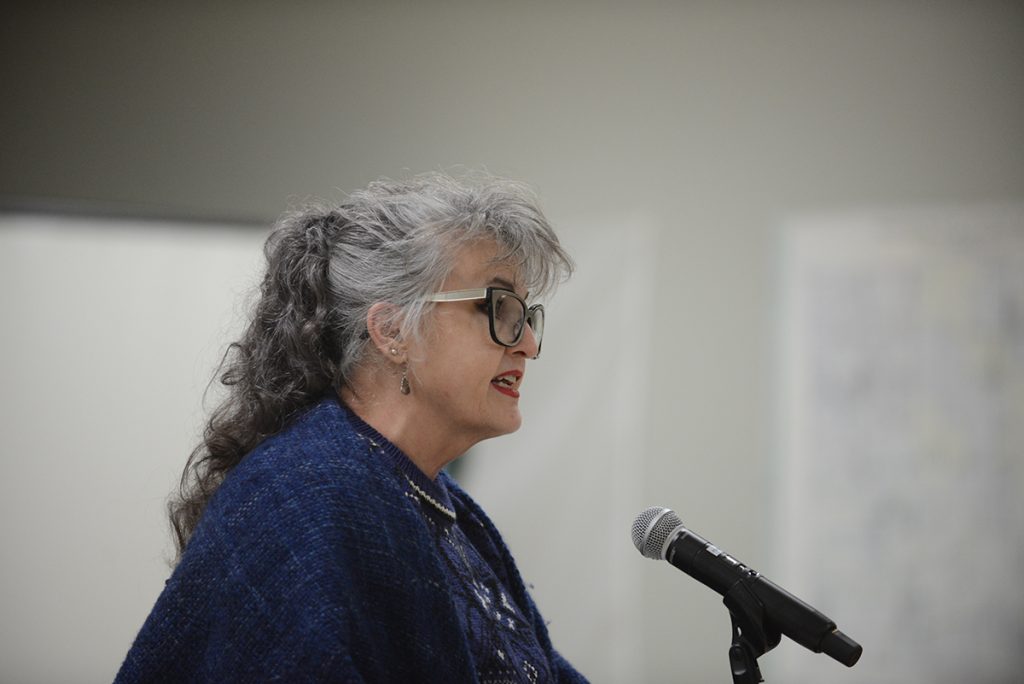
(Photo by Kevin Mathewson, Kenosha County Eye)
Mary Magdalen Moser, a long-time poll worker and Chief Election Inspector from Kenosha, shared her shock over the handling of the election in Bristol. Moser recounted how she was asked to assist with vote reconciliation at the Bristol Town Hall but was alarmed to find sensitive election materials unsecured on a cafeteria table. The DS-200 scanner was left unlocked, creating a security issue
Moser expressed frustration with the Bristol Municipal Clerk, who had failed to provide the necessary support during the reconciliation process. She described the clerk as “grotesquely incompetent” and criticized her for continually blaming others, including the Chief Election Inspector and poll workers, for the issues that were clearly the clerk’s responsibility.
“This is about competent and legal election administration,” Moser stated. “The Bristol election was a complete disaster, and this board must fire its municipal clerk immediately, because we have another election in three short months.” She warned that if the situation was not addressed, “there will be lawsuits, and the town of Bristol will lose and lose big.”
Organizational Failures: Disorganization and Staffing Shortages
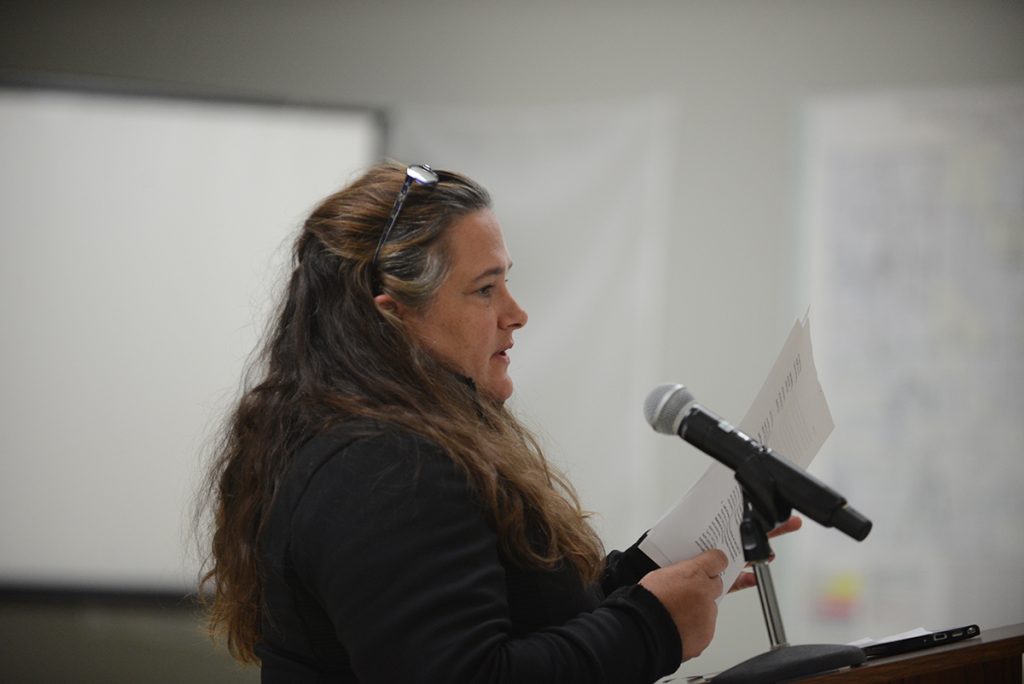
(Photo by Kevin Mathewson, Kenosha County Eye)
Angela Kretschmer, another poll worker, painted a similarly bleak picture of election day operations. She reported multiple issues, including confusion and delays due to improper setup and a lack of necessary materials. The chief inspector struggled to open the polling place correctly, and Kretschmer was tasked with voter registration without the proper ineligibility information.
“We needed more poll workers. We had no greeter. At one time, I was working three different jobs,” Kretschmer noted. She also raised concerns about unsecured ballots scattered around the polling location, highlighting serious security risks.
Kretschmer expressed concern about disenfranchising voters due to the long wait times and confusion, emphasizing that decisions made by election officials had real consequences for voters: “People are bringing you problems… you need to listen to all sides and make better decisions for the people that are on the ground.”
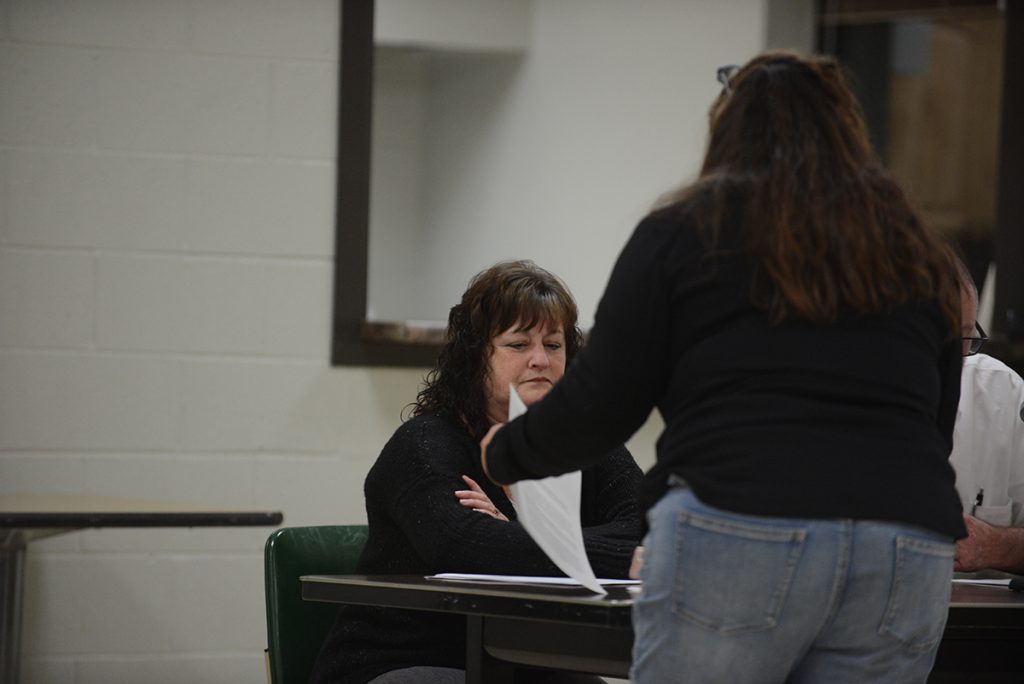
(Photo by Kevin Mathewson, Kenosha County Eye)
Election Day Setbacks and Staffing Issues at First Christian Church
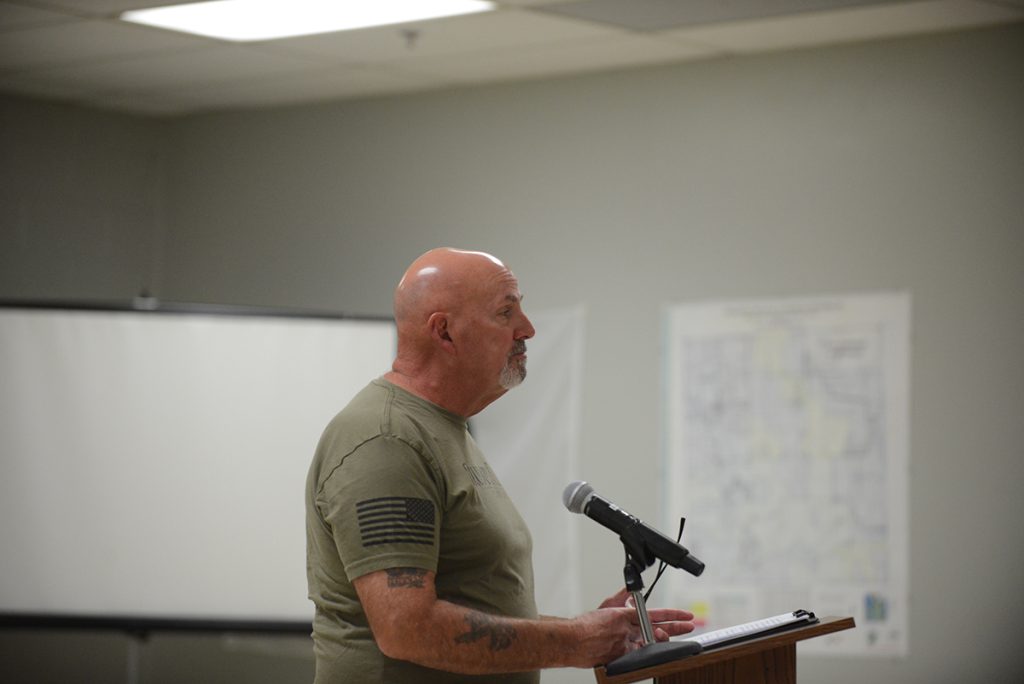
(Photo by Kevin Mathewson, Kenosha County Eye)
David Patterson, who worked at the First Christian Church polling location, also shared his experience, which he described as a “lessons-learned approach” rather than assigning blame. Patterson described how the polling location was delayed opening because the keys to access the church were missing, requiring church members to help gain entry. This delayed the process and caused long lines of waiting voters. Additionally, Patterson and a colleague were assigned to handle absentee ballots, but the envelopes were not alphabetized, further contributing to delays.
“There was just a bare minimum number of workers,” Patterson said, pointing out the lack of preparation and communication among poll workers. He also noted that the curbside voting sign was incorrect, causing confusion for those seeking assistance.
Frustration with Local Governance: “The Bristol Way”
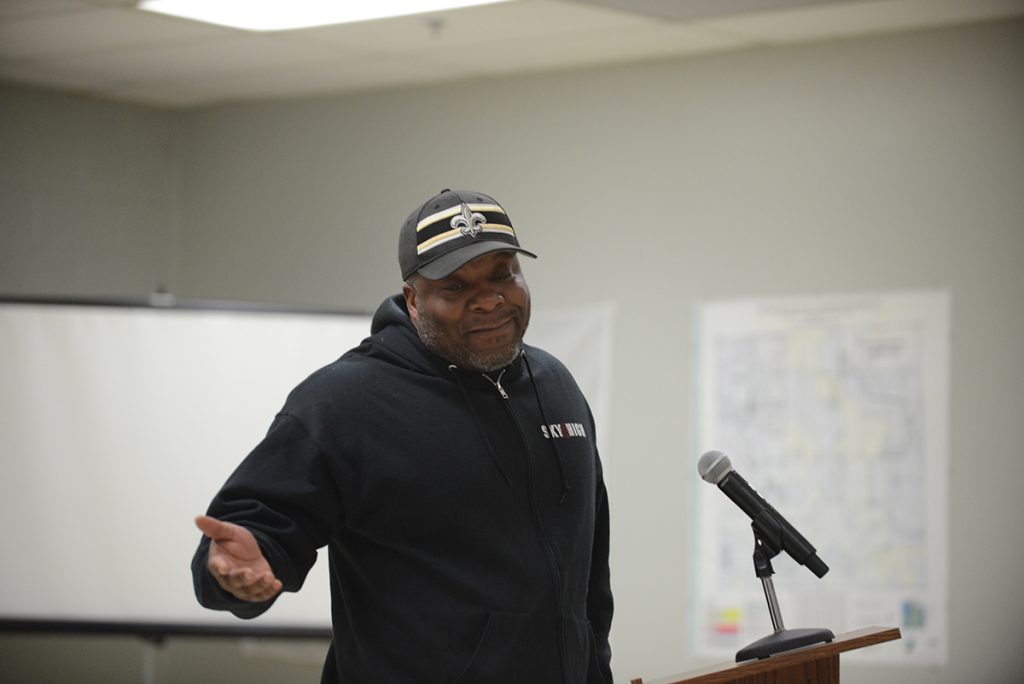
(Photo by Kevin Mathewson, Kenosha County Eye)
Finally, Quentin Van Jackson expressed his ongoing frustration with the local government’s approach to addressing problems. Jackson critiqued the board’s reluctance to embrace change, citing a previous meeting where concerns about the election process were dismissed with the sentiment, “it’s been done since 2000, why change it now?”
“There’s rules and regulations, there’s laws, and then there’s the Bristol way,” Jackson stated, suggesting that Bristol’s ingrained practices needed reform. He also pointed out that the town’s failure to post meeting minutes online reflected a lack of transparency and accountability in the local government.
“I’ve been trying to get in minutes for months to get my circulation on the website, and they refuse to put mine because I tell the truth,” Jackson said. He also questioned whether the board was truly in charge or if there were other forces influencing decisions behind the scenes.
Conclusion: A Call for Change
As citizens voiced their concerns at the meeting, it was clear that a significant number of issues related to election management, transparency, and governance in Bristol remain unresolved. With accusations of incompetence, disorganization, and a lack of accountability, several speakers called for immediate action to address these problems before the next election.
It is clear from the public comments that many are seeking a more efficient, transparent, and accountable process moving forward. Whether or not these calls for reform will lead to meaningful changes remains to be seen, but the voices of concerned citizens have certainly made their impact known.













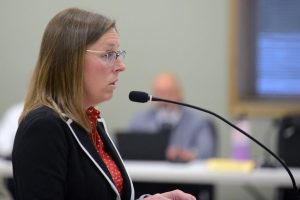
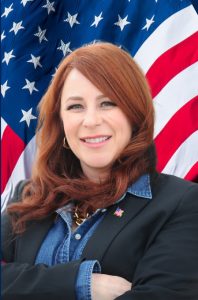


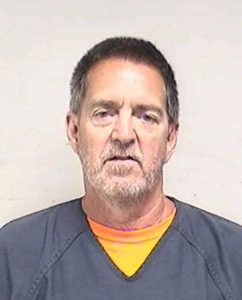

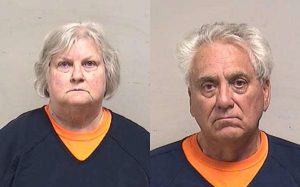









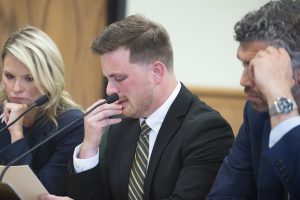





11 Responses
What is wrong with the board? When so many workers show up to tell the board that the clerk is not doing her job, why won’t the board do the right thing and fire her? all those people can’t be wrong!
“What is wrong with the board ?”
Me thinks they are out of their element.
Isn’t the administrator responsible
for all employees ?
Hiring. Firing. Vetting new candidates ?
And yet the administrator is not without controversy.
So if the board says get rid of her, how do they move forward ? Quickly !
Incompetence runs rampant.
Time to recruit new candidates for the next two board elections. Current board members. Step up or step out. Show us you can lead, or get the hell out of the way !!
Well put. It shows in the meetings that the board has no control and is intimidated by the administrator…
As strong as the administrator is in Salem, the board is anything but intimidated by her.
They give her direction and are constantly pleased with the decision choices she brings back for their consideration.
And sometimes even then when the choices she brings back are not what they thought they would be, the board sends her out again with new directions.
She serves at the pleasure of the board. Not the other way around.
Cassandra Hiller is a great administrator there. People say she’s from Illinois. Yes, but other places too !
She has a long list of varied job experiences which gives her knowledge beyond her salary.
Bristol should start immediately looking for a new administrator. Along with a new clerk, even if it’s just a temporary one while looking for a new permanent hire.
Staying the current coarse is not an option.
I don’t recommend swamp things from IL. They bring plenty of corruption
Hooterville
Clerk probably works fir the board, not the admin.
Needs an agenda to fire.
And perhaps a unanimous board vote.
Depends on contract of appointed clerk.
This is a perfect example of why we need elected clerks, because then we could unelected them!
Yes the board makes final decisions to fire (and hire) because they are not watching day to day operations.
This comes after the recommendation of the administrator in closed session stating cause.
But to limit your available hires to only citizens of the village as small as it is, is like trying to find a needle in a haystack.
Wheatland went through this issue a few years ago because their long time (elected) clerk decided to not seek office anymore.
The clerks job requires knowledge and commitment beyond what it did all those years ago.
But by your logic, who among you is qualified ?
Kerkman gave the board her name as recommendation for the job and they told him to hire her. So he did because bggey do whatever he tells them. I was at the meeting and witness the whole pitiful thing.
Typo… they do whatever he tells them